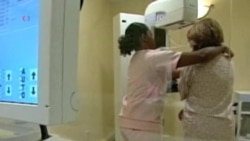Theater has been used to help people learn about everything from AIDS to mental health issues. Now a there's a play to help doctors and nurses understand their patients with breast cancer.
It's the news no woman ever wants to hear:
“You have invasive breast cancer.”
While this is a play, the news is often real and devastating for many women. Breast cancer is the leading cause of cancer death in women worldwide.
Zulima Palacio is a breast cancer patient in the U.S. She recalls the shock when her doctor gave her the results of her biopsy.
"The first time she told me, I was numb, completely like, Huh? Like, I don’t get it. Like ‘not me.’ This is something that happens to other people, not me," she said.
Palacio has the support of her husband and friends, compassionate nurses and doctors she trusts. But not all breast cancer patients have that.
The University of Missouri is trying to help with a play called Breast Cancer Dialogues.
One goal is to help medical students, doctors and nurses to be more responsive to their patients' needs.
The dialogues are from real life experiences. Seeing the sometimes harsh reality does make a difference says Dr. James Campbell.
“When students are first starting out as future physicians, they learn that it's important to establish a relationship and rapport with their patient and to be able to communicate effectively," he said.
Just as important as the script is the fact that the audience can rewrite it to allow a more caring interaction between patient and doctor. Rachel Baur coordinates the productions.
“That’s one of the things we do with interactive theatre, when they [the audience] see something they don’t like, they yell ‘stop!’ And we stop the scene, and then they can intervene, and that is where we get the most feedback from audiences of saying ‘no, that can’t happen. I won’t let this happen to this patient," she said.
“Your chances of survival are much better than 20 years ago. Back then you would have been a goner," said an actor in the play.
What the doctor could have said in a better way is that 70 percent of women who get breast cancer can be cured, provided they get early treatment. The World Health Organization says, in order to prevent deaths, men and women who notice some difference in their breasts need to get medical attention without delay.
Watch VOA's Carol Pearson's upcoming reports on breast cancer patient Zulima Palacio. The reports follow Palacio's battle with breast cancer and her final outcome.
It's the news no woman ever wants to hear:
“You have invasive breast cancer.”
While this is a play, the news is often real and devastating for many women. Breast cancer is the leading cause of cancer death in women worldwide.
Zulima Palacio is a breast cancer patient in the U.S. She recalls the shock when her doctor gave her the results of her biopsy.
"The first time she told me, I was numb, completely like, Huh? Like, I don’t get it. Like ‘not me.’ This is something that happens to other people, not me," she said.
Palacio has the support of her husband and friends, compassionate nurses and doctors she trusts. But not all breast cancer patients have that.
The University of Missouri is trying to help with a play called Breast Cancer Dialogues.
One goal is to help medical students, doctors and nurses to be more responsive to their patients' needs.
The dialogues are from real life experiences. Seeing the sometimes harsh reality does make a difference says Dr. James Campbell.
“When students are first starting out as future physicians, they learn that it's important to establish a relationship and rapport with their patient and to be able to communicate effectively," he said.
Just as important as the script is the fact that the audience can rewrite it to allow a more caring interaction between patient and doctor. Rachel Baur coordinates the productions.
“That’s one of the things we do with interactive theatre, when they [the audience] see something they don’t like, they yell ‘stop!’ And we stop the scene, and then they can intervene, and that is where we get the most feedback from audiences of saying ‘no, that can’t happen. I won’t let this happen to this patient," she said.
“Your chances of survival are much better than 20 years ago. Back then you would have been a goner," said an actor in the play.
What the doctor could have said in a better way is that 70 percent of women who get breast cancer can be cured, provided they get early treatment. The World Health Organization says, in order to prevent deaths, men and women who notice some difference in their breasts need to get medical attention without delay.
Watch VOA's Carol Pearson's upcoming reports on breast cancer patient Zulima Palacio. The reports follow Palacio's battle with breast cancer and her final outcome.








